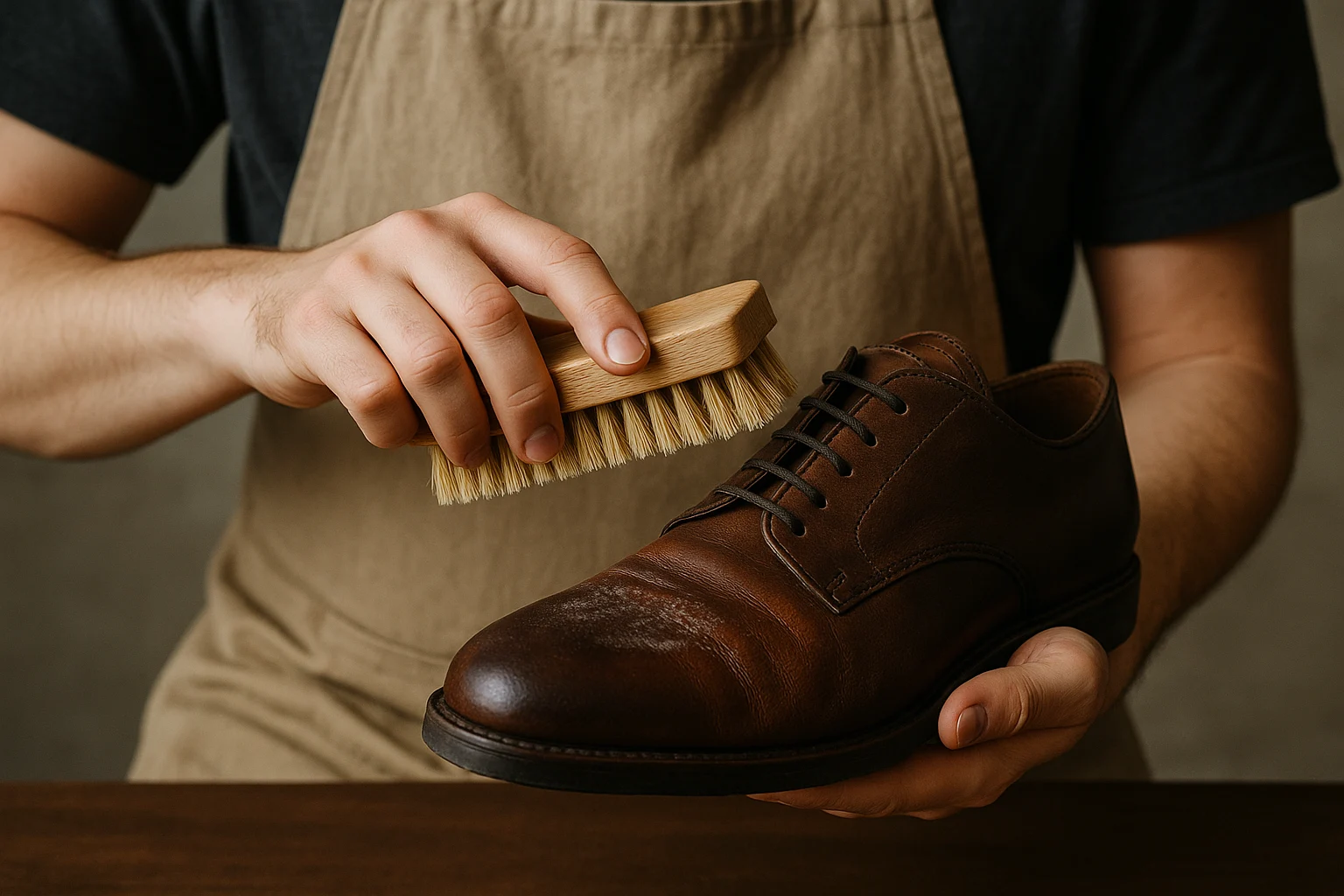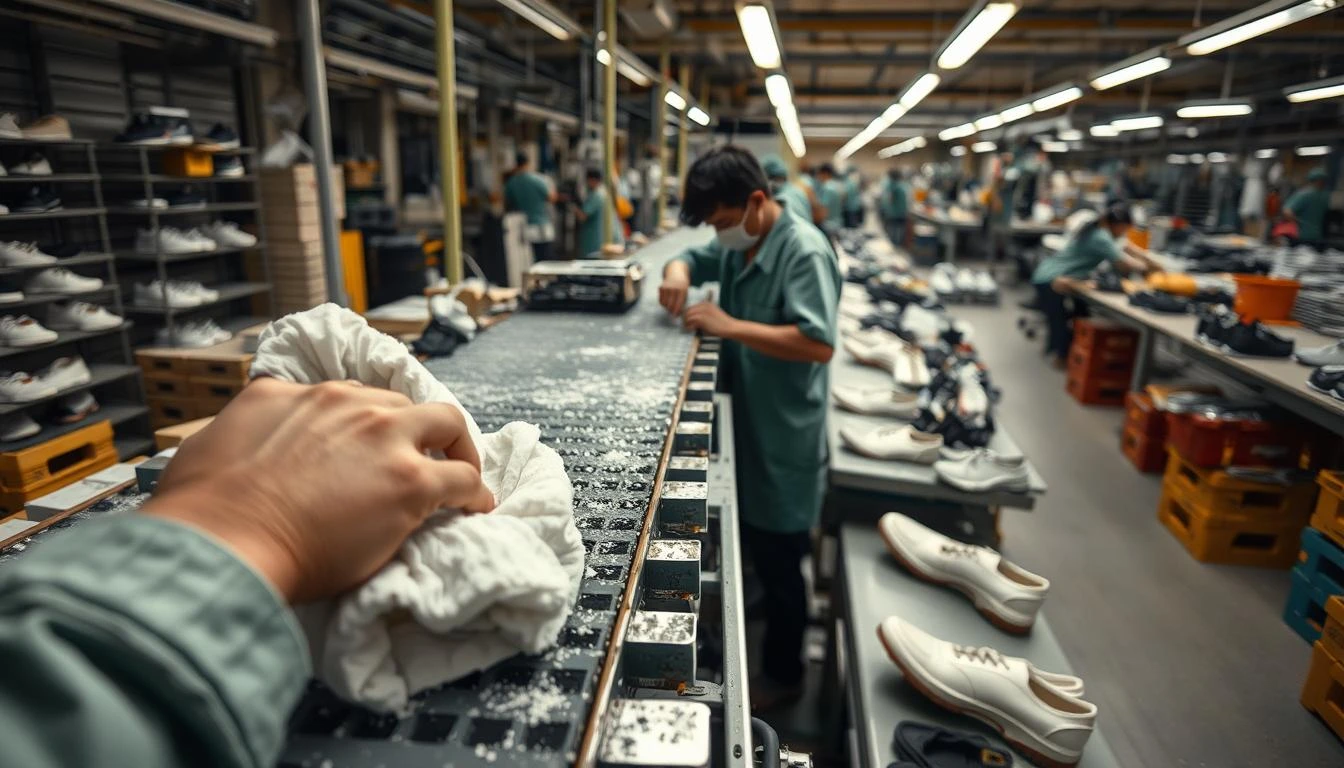The production of high-quality footwear requires meticulous attention to detail, and cleaning plays a crucial role in the shoe manufacturing process. A cleaner specifically designed for shoe manufacturing is used to remove dirt, grime, and other substances that can affect the appearance and durability of the final product.
The use of a cleaner in footwear production ensures that the materials used are free from contaminants, resulting in a higher quality finish. This is particularly important in the production of premium footwear, where the appearance and durability of the shoes are paramount.

The Fundamentals of Shoe Manufacturing Cleaners
The foundation of effective shoe manufacturing lies in the quality of cleaners used throughout the production process. Footwear cleaning is a critical step that ensures the removal of contaminants, thereby enhancing the overall quality of the final product.
Definition and Core Functions
Shoe manufacturing cleaners are specialized cleaning agents designed to remove dirt, grime, and other substances from various materials used in footwear production. These cleaners play a crucial role in preparing surfaces for further processing, such as bonding, finishing, and quality control.
Evolution of Cleaning Agents in Footwear Production
The evolution of cleaning agents in footwear production has been significant, transitioning from traditional methods to more modern and efficient solutions.
Traditional Cleaning Methods
Traditional cleaning methods often involved the use of harsh chemicals and manual labor, which could be time-consuming and potentially harmful to workers. These methods were not always effective, leading to inconsistencies in product quality.
Modern manufacturing cleaners have been developed to address the limitations of traditional methods. These cleaners are designed to be more effective, safer for workers, and environmentally friendly. They offer improved cleaning efficiency and consistency, contributing to higher quality footwear products.
The shift towards modern cleaning solutions reflects the industry’s move towards more sustainable and efficient practices, ultimately benefiting both manufacturers and consumers.
Types of Cleaner for Shoe Manufacturing
In the footwear industry, the choice of cleaner can significantly impact the production process and final product quality. Various types of cleaners are used, each catering to specific needs and materials involved in shoe manufacturing.
Solvent-Based Cleaning Agents
Solvent-based cleaners are effective for removing stubborn contaminants. They are categorized into:
- Petroleum-Based Solvents: These are commonly used for their ability to dissolve grease and oil-based substances.
- Chlorinated Solvents: Known for their strong cleaning power, they are used for tough residue removal.
Water-Based Cleaning Solutions
Water-based cleaners offer a safer and more environmentally friendly alternativ
They include:
- Detergent Formulations: These are versatile and effective for general cleaning purposes.
- Enzymatic Cleaners: Utilizing enzymes to break down protein-based contaminants, they are ideal for specific material types.
Eco-Friendly Alternatives
With the growing emphasis on sustainability, eco-friendly cleaners have gained prominence. They include:
- Plant-Based Cleaners: Derived from natural sources, these cleaners are biodegradable and gentle on materials.
- Biodegradable Options: Designed to minimize environmental impact, they offer a sustainable cleaning solution.
The selection of a cleaner depends on the specific requirements of the shoe manufacturing process, including the type of material being cleaned and the level of contamination. By choosing the appropriate cleaner, manufacturers can enhance product quality and reduce environmental impact.
Chemical Composition and Active Ingredients
Understanding the chemical makeup of shoe cleaners is crucial for optimizing their performance in footwear production. The effectiveness of these cleaners depends on their chemical composition and the active ingredients that enable them to remove dirt, grime, and manufacturing residues from shoe materials.
Key Chemical Components
The primary chemical components in shoe manufacturing cleaners include surfactants, which reduce surface tension, allowing for better penetration and removal of contaminants. pH regulators and buffers are also crucial as they maintain the cleaner’s effectiveness across various surfaces.
Specialized Additives for Footwear Applications
Beyond the primary cleaning agents, shoe manufacturing cleaners often contain specialized additives that enhance their performance. These include anti-static agents and corrosion inhibitors, which protect both the shoes and the manufacturing equipment.
Anti-Static Agents
Anti-static agents reduce static electricity, which can attract dust and interfere with the manufacturing process. This is particularly important in the production of shoes with synthetic materials.
Corrosion Inhibitors
Corrosion inhibitors protect metal components and manufacturing equipment from corrosion, extending their lifespan and maintaining production efficiency.
|
Chemical Component |
Function |
| Surfactants | Reduce surface tension, emulsify oils |
| pH Regulators | Maintain optimal pH level |
| Anti-Static Agents | Reduce static electricity |
| Corrosion Inhibitors | Protect against corrosion |
Applications Throughout the Shoe Production Process
Cleaning plays a crucial role in the footwear production process, from material preparation to final product finishing. The various stages of shoe manufacturing require specific cleaning solutions to ensure quality and efficiency.
Pre-Production Material Preparation
Before production begins, materials need to be properly cleaned and prepared. This includes leather treatment and synthetic material preparation.
Leather Treatment
Leather requires special care to maintain its quality. Cleaning solutions used for leather treatment help remove dirt and impurities without damaging the material.
Synthetic Material Preparation
Synthetic materials also need to be cleaned before use. The cleaning process for these materials is designed to remove manufacturing residues and prepare the surface for further processing.
During-Production Cleaning Requirements
During production, cleaning is necessary for maintaining equipment and ensuring a smooth assembly line process.
Regular cleaning of molds and equipment prevents the buildup of residues and contaminants, which can affect product quality.
The assembly line requires frequent cleaning to prevent the accumulation of debris and ensure efficient production.
Post-Production Finishing Processes
After production, the final products need to be cleaned and prepared for packaging.
The final products are cleaned to remove any residues or contaminants accumulated during production.
Before packaging, the products are inspected and cleaned to ensure they meet quality standards.
| Production Stage | Cleaning Requirement | Benefits |
| Pre-Production | Material Cleaning | Improved Material Quality |
| During Production | Equipment and Mold Cleaning | Increased Efficiency and Reduced Downtime |
| Post-Production | Final Product Cleaning | Enhanced Product Quality and Customer Satisfaction |
Final Thought
By understanding the importance of cleaners in shoe manufacturing and following best practices for application and handling, manufacturers can enhance the overall efficiency and quality of their production processes. This includes considering factors such as material compatibility, cost-benefit analysis, and environmental compliance.
As the footwear industry continues to evolve, the development of sustainable and biodegradable cleaning formulations is becoming increasingly important. By adopting effective cleaning solutions and staying up-to-date with the latest innovations, shoe manufacturers can improve their products and reduce their environmental footprint.

